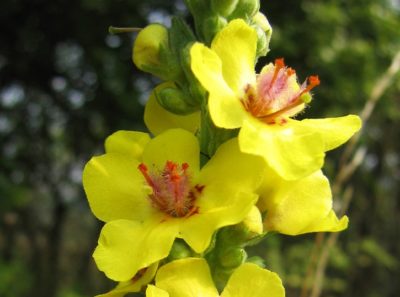 Mullein has many uses – and is known by many names. The herbal plant, which is also widely known as begger’s blanket, lungwort, and candlewick, is both tall and downy.
Mullein has many uses – and is known by many names. The herbal plant, which is also widely known as begger’s blanket, lungwort, and candlewick, is both tall and downy.
For hundreds of years folks dunked the mullein plant’s stalk in tallow so it could be used as a torch or candle — and it still can be used in that manner today. The soft and hairy leaves of the mullein plant earned it the begger’s blanket nickname and made it a coveted possession when folks chose, or were forced to, sleep outdoors.
Mullein grows in barren, dry places, and has been heralded for its medicinal properties for centuries. The gray-green rosette of the mullein plant produces 6- to 12-inch leaves.
When matured, the mullein plant will sprout a flowering spike with colorful yellow flowers that open one at a time. Although Mullein thrives in dry areas, it is also known to grow well in nearly any type of soil and can be grown in gardens – a great “grow-your-own pharmacy” option for off-the-grid families.
Mullein Tea
The healing properties in the plant are largely found in its flowers, leaves and roots. Native Americans and modern herbalist have used the wild plant to cure or help alleviate the symptoms or respiratory disorders. When the mullein plant is used to make a medicinal tea, its expectorant mucilaginous juices and saponins are believed to help heal sore throats and to soothe coughs. Mullein tea has a broth-like color and consistency after brewing and the taste is sweet – another plus for any medicinal aid. The slippery tea coats the back of the throat and eases soreness.
The Hidden Secrets Of Making Herbal Medicines…Right At Your Fingertips!
Mullein tea is also often regarded as a sound treatment for asthma, bronchitis and various seasonal allergies. Because of their toxicity, the seeds of the mullein plant should never be used in the making of tea or oil. Mullein tea is amazingly easy to make. Simply steep the leaves in hot water. To sweeten the taste, toss in a few of the plant’s flowers. The tea can be consumed either hot or cold without a reduction in health benefit, herbalists believe.
Anti-Bacterial Sanitizer
The mullein plant is thought to possess anti-bacterial attributes, with the ability to ward off infection. Laboratory studies have reportedly shown that the mullein plant possesses anti-fungal, anti-viral and anti-tumor properties.
Story continues below video
Anti-Inflammatory Uses
A mullein poultice may help soothe common skin irritations, such as rashes, boils and even chilblains. The poultice can also be helpful in the healing of bruises and to relieve arthritic and rheumatic conditions. The plant’s anti-inflammatory and anti-bacterial attributes have also prompted herbalists and those who favor natural methods of healing to make compresses for hemorrhoids and cold sores. The poultices and teas made from the plant have been used to enhance the healthy functioning of the thyroid gland. Mullein can have a calming effect and has been used to help relieve migraine headache pain and as a sleep aid.
New “Survival Herb Bank” Gives You Access to God’s Amazing Medicine Chest
Digestive Disorders
The mullein plant has also been used to ease digestive problems, such as various stomach pains and diarrhea. The wild plant’s anti-spasmodic properties have been heralded as an organic alternative for stomach cramp relief. Oil derived from the flowers of the mullein plant have also been used to treat swollen glands.
Side Effects
Consuming mullein in excess can lead to an upset stomach. Lightly scrubbing the thin hairs off of the plant has helped eliminate or reduce stomach irritation in some users.
Have you ever used mullein? What advice would you add for its usage? Share your thoughts in the section below:
Harness The Power Of Nature’s Most Remarkable Healer: Vinegar
 Off The Grid News Better Ideas For Off The Grid Living
Off The Grid News Better Ideas For Off The Grid Living




